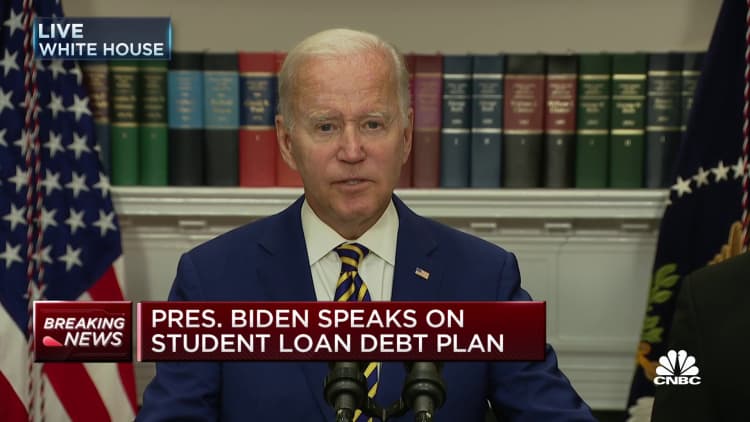West | Istock | Getty Images
The Biden administration’s most recent announcement that the pause on federal student loan bills would be extended left borrowers with more uncertainty: It didn’t provide a date for when the payments would resume.
The pandemic-era relief policy suspending federal student loan bills and the accrual of interest has been in effect since March 2020. Turning the $1.7 trillion lending system back on for some 40 million Americans is a massive task that the U.S. Department of Education has been reluctant to undertake.
The administration had hoped to ease the transition for borrowers by first forgiving a large share of student debt, but its plan to do so, unveiled in August, soon faced a barrage of legal challenges and remains tied up in the courts. That development is why borrowers have gotten even more time without a student loan bill.
Here’s what you need to know about the latest payment pause extension.
Student loan bills could resume as soon as May 1
The Education Department has left things a little open-ended when it comes to the timing of federal student loan payments resuming.
It has said the bills will be due again only 60 days after the litigation over its student loan forgiveness plan resolves and it’s able to start wiping out the debt.
If the Biden administration is still defending its policy in the courts by the end of June, or if it’s unable to move forward with forgiving student debt by then, the payments will pick up at the end of August, it said.

Most recently, the Supreme Court has said it will hear oral arguments around the president’s plan in February.
That means the earliest that payments could restart would likely be May 1, if the justices reach a quick decision, said higher education expert Mark Kantrowitz.
Borrowers who are behind may get a ‘fresh start’
The U.S. government has extraordinary collection powers on federal debts and it can seize borrowers’ tax refunds, wages and Social Security checks if they fall behind on their student loans.
During the extended payment pause, however, the Education Department is also ceasing all collection activity, it said.
Borrowers in default on their student loans should also look into the recently announced “Fresh Start” initiative, in which they’ll have the opportunity to return to a current status.
Refinancing may be worth considering
Kantrowitz had previously recommended that, despite the chance of picking up a lower interest rate, federal student loan borrowers refrain from refinancing their debt with a private lender while the Biden administration deliberated on how to move forward with forgiveness. Refinanced student loans wouldn’t qualify for the federal relief.
Now that borrowers know how much in loan cancellation is coming — if the president’s policy survives in the courts — borrowers may want to consider the option, Kantrowitz said. With the Federal Reserve expected to continue raising interest rates, he added, you’re more likely to pick up a lower rate with a lender today than down the road.
Still, Kantrowitz added, it’s probably a small pool of borrowers for whom refinancing is wise.
It would be deeply unfair to ask borrowers to pay a debt that they wouldn’t have to pay, were it not for the baseless lawsuits brought by Republican officials and special interests.
Miguel Cardona
Secretary of the U.S. Department of Education
He said those include borrowers who don’t qualify for the Biden administration’s forgiveness — the plan excludes anyone who earns more than $125,000 as an individual or $250,000 as a family — and those who owe more on their student loans than the administration plans to cancel. Those borrowers may want to look at refinancing the portion of their debt over the relief amounts, Kantrowitz said.
Borrowers need to first understand the federal protections they’re giving up before they refinance, warns Betsy Mayotte, president of The Institute of Student Loan Advisors.
For example, the Education Department allows you to postpone your bills without interest accruing if you can prove economic hardship. The government also offers loan forgiveness programs for teachers and public servants.
“Your rate doesn’t matter if you lose your job, have sudden medical expenses, can’t afford your payments and find that defaulting is your only option,” Mayotte said, in a previous interview about refinancing.
Make the most of extra cash during the payment pause
Boy_anupong | Moment | Getty Images
With headlines warning of a possible recession and layoffs picking up, experts recommend that you try to salt away the money you’d usually put toward your student debt each month.
Certain banks and online savings accounts have been upping their interest rates, and it’s worth looking around for the best deal available. You’ll just want to make sure any account you put your savings in is FDIC-insured, meaning up to $250,000 of your deposit is protected from loss.
And while interest rates on federal student loans are at zero, it’s also a good time to make progress paying down more expensive debt, experts say. The average interest rate on credit cards is currently more than 19%.
Some may want to keep paying during the pause
If you have a healthy rainy-day fund and no credit card debt, it may make sense to continue paying down your student loans even during the break, experts say.
There’s a big caveat here, however. If you’re enrolled in an income-driven repayment plan or pursuing public service loan forgiveness, you don’t want to continue paying your loans.
That’s because months during the government’s payment pause still count as qualifying payments for those programs, and since they both result in forgiveness after a certain amount of time, any cash you throw at your loans during this period just reduces the amount you’ll eventually get excused.
 EU News Digest Latest News & Updates
EU News Digest Latest News & Updates



